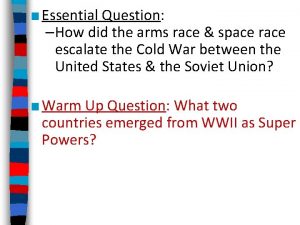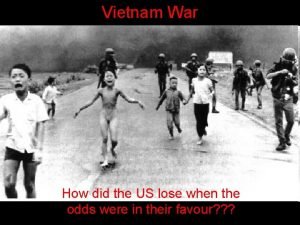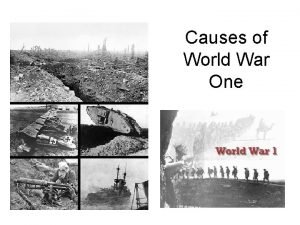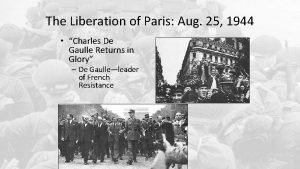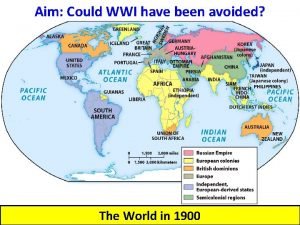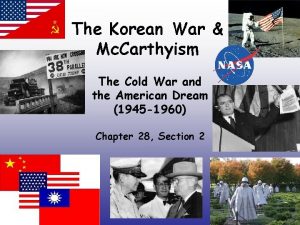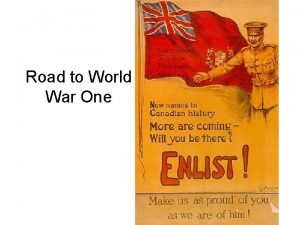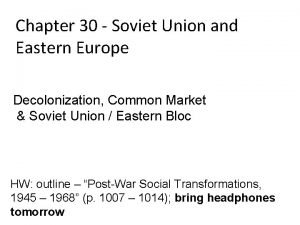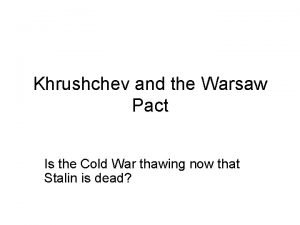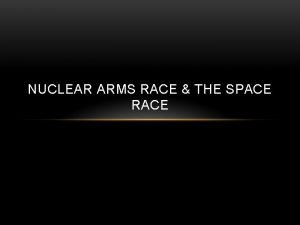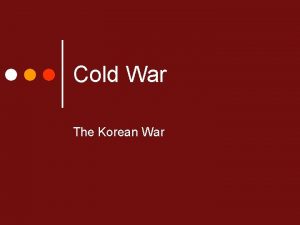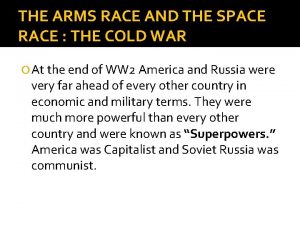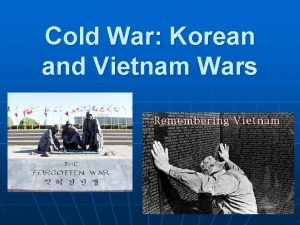Korean War The Space Race The Arms Race











- Slides: 11

Korean War, The Space Race, The Arms Race Korean War: Many Americans believed their government had not done enough to prevent the fall of China to Communism. This criticism of the U. S. foreign policy affected American actions at the time of the outbreak of the Korean War. (1950 -1953) The Arms Race: Atomic Bomb / Hydrogen Bomb / Nuclear Deterrent The Space Race: Sputnik : 1957

�America � 1949, did not share atomic bomb secrets Soviets have their own a-bomb � 1952: U. S. developed Hydrogen Bomb �(Much more powerful than the original a-bomb) Arms Race

�In less than 1 year the Soviet Union exploded its first hydrogen bomb. �Two Superpowers have a smaller technology gap than had previously be thought Arms Race

�Sputnik: Soviet Union launches first satellite � 1957 �Not much larger than a basketball � 184 pounds Space Race

�Orbited the Earth once every 98 minutes with a radio transmitter that did little more than issue a frequent beep that allowed it to be tracked �Raised fear that the Soviet Union might use missiles to send Nuclear Bombs to the U. S. � 1958: space U. S. launched its own satellite into Space Race

�Loyalty Review Boards: Investigated individual “un-American” activities. ◦ These victims were often not able to defend themselves or even know who had accused them. (HUGE violation of their Constitutional Rights) �House Un-American Activities Committee: Congress conducts its own loyalty checks ◦ Questioned actors, directors, writers, and others about their possible Communist sympathies. ◦ Those identified as present, former or showing sympathies towards the Communist Party were usually “Blacklisted” & lost their jobs. Cold War at Home

�Julius & Ethel Rosenberg: Were charged with selling national secrets to the Soviet Union about the atomic bomb. Found Guilty. Executed. �Venona Papers: National Security Agency released these formerly classified papers in 1997. A secret effort by the U. S. to gather and decode messages sent by Soviet military intelligence agents. Revealed the identities of several Americans who had spied for the Soviets. Julius Rosenberg was on that list Cold War at Home

�Joseph Mc. Carthy: U. S. Senator who claimed he had the names of Communist who had infiltrated the U. S. State Department and other government agencies. No proof. Eventually formally criticized by the Senate �Mc. Carthyism: Term that has become identified with making harsh accusations without evidence. Cold War at Home

�Eisenhower Doctrine: 1957; We would send U. S. forces to any Middle Eastern nation that requested help in defending against Communism �Interstate Highway Act: Created a system of federal highways Cold War at Home / Eisenhower

�Housing Boom: Home ownership increased by 50%. The movement of middle-income families to the suburbs led to a declining urban tax base and decaying inner cities. �Baby Boom: High Birth Rate. �G. I. Bill: Servicemen’s Readjustment Act. Pays for college! Cold War at Home / Eisenhower

�Economic Prosperity: Millions of autos & TV sets were sold. America dominated world trade �Conformity: conformity Greater emphasis on Cold War at Home / Eisenhower
